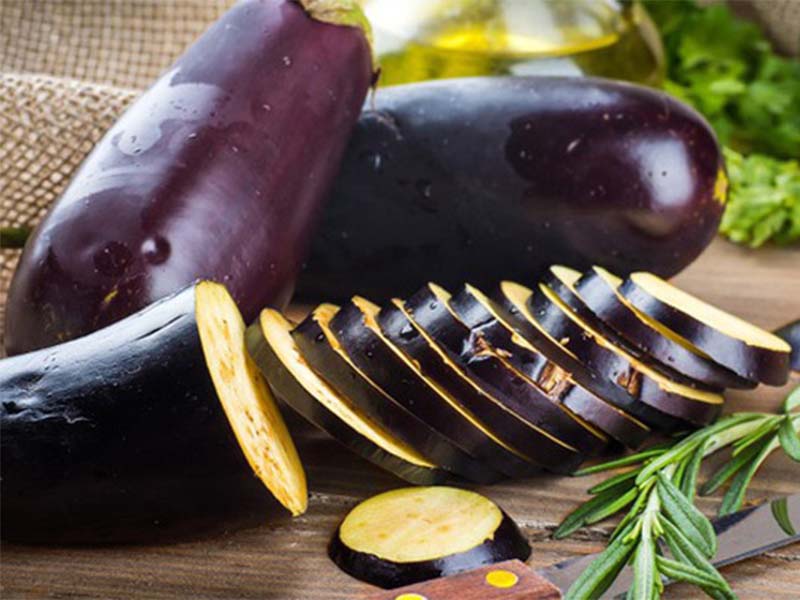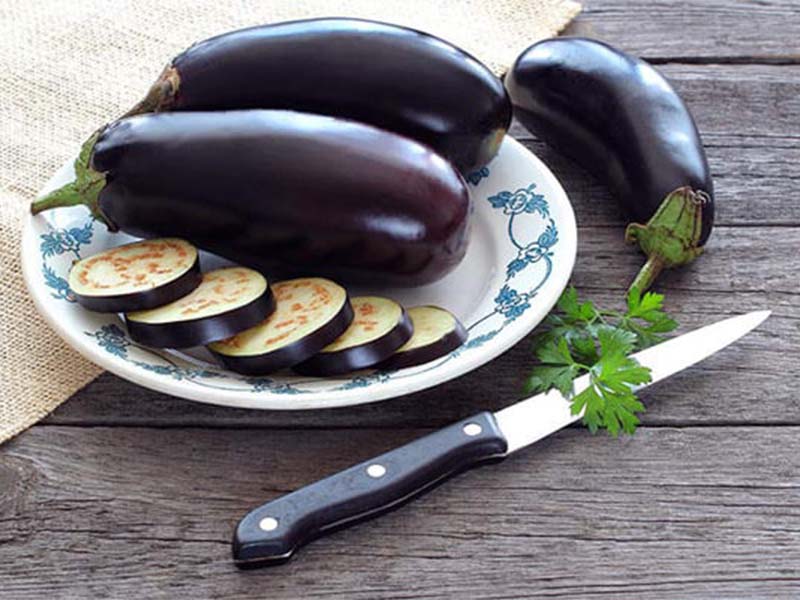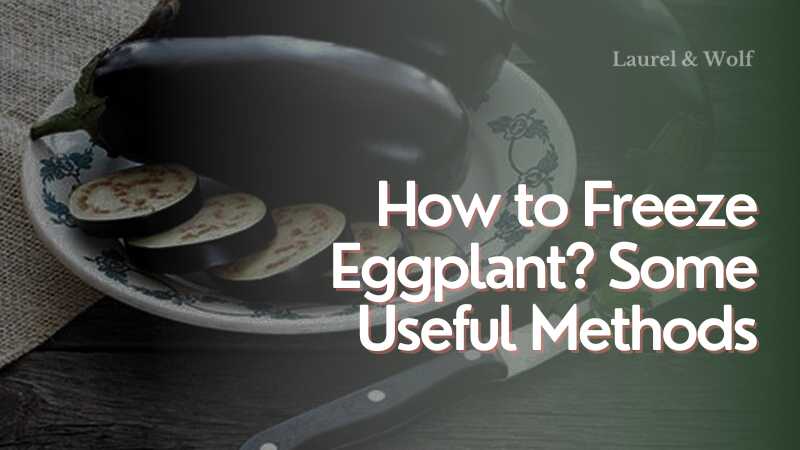Eggplant, a nutrient-rich ingredient adored by many, is simple to cook. Spice Kitchen will reveal several easy-to-follow methods for freezing eggplant in this article. This practical approach ensures these ingredients are at your disposal in your kitchen anytime you require them. Let’s embark on this exploration together!

How to Freeze Eggplant?
You can freeze eggplants to keep them longer, up to 8 months. Just follow our instructions below.
- Wash and cut the eggplant horizontally into 1-inch circles.
- Place the eggplant slices on a baking tray lined with parchment paper.
- Add olive oil and salt to your liking
- Place in the oven at 350°C for 15 minutes.
- Wait until the eggplant slices cool completely.
- Place the slices in a zip bag and put them in the freezer. Note, separate the slices with stencils so they don’t stick together.
- Date the bag and you can keep it for up to 8 months.
Detailed Instructions for Freezing Eggplant
Follow our detailed 4-step guide to the best eggplant freezing!
- Step 1: Choose eggplant
Freeze the best fresh eggplants, buy them in season. From about August to October every year. High-quality eggplants are large, round, smooth skins that feel firm when you hold them. Use your fingers to press the eggplant body to see its elasticity. Especially the stalk is still green. These are freshly picked, and good-quality eggplants.
- Step 2: Prep your eggplant
Wash the eggplant with clean water and then cut the eggplant into slices horizontally or vertically. You can also remove its skin if you wish. However, the eggplant skin has a healthy nutritional composition, you should keep it.
Before freezing eggplants, you need to blanch, bake, or pre-cook your favorite dishes. Then let it cool or puree and put it in the freezer of the refrigerator.
If you’re blanching in boiling water, you’ll need to remove the eggplant skin. At the same time, prepare a bowl of cold water so that as soon as you take the eggplant out of the pot, immediately put it in a bowl of cold water.
- Step 3: Close the eggplant bag
After the eggplant has been pre-cooked, wait until the eggplant is completely cooled, then take each eggplant part and put it in zip bags. If you don’t like the eggplant slices touching each other, separate them with wax paper. You can then use a vacuum or somehow get as much air out as you can.
- Step 4: Freeze Eggplant
Now use a pen to write the date on the bag and put it in the freezer of the refrigerator. So you can use them for 8 months.
What are the Health Benefits of Eggplant?
In eggplant, there are many healthy nutrients such as calcium, iron, protein, energy, … Especially Nasunin helps reduce inflammation, protects DNA and cell membranes, helps the body absorb nutrients. Let’s find out more together!
Nutritional value of eggplant
In 100g of eggplant there are:
- 100kcal of energy
- 1000mg protein
- 4.5g starch
- 500mg ash
- 15mg calcium
- 400mcg iron
- 92.4g water
- 1.5g fiber
- 34mg phosphorus
- 10mcg carotene
- 5g disposal rate
- 15mg vitamin C
- 600mg vitamin PP
- 100mcg vitamin B2
Health benefits of eggplant
Through the table of ingredients above, we can see that eggplant has no fat, no cholesterol, which is very good for vegetarians and people with heart disease. Specifically, eggplant has the following health benefits:
- Reduces Inflammation: Nasunin present in eggplant has anti-inflammatory effects and reduces stress. It also helps to remove toxic metals (mercury, arsenic, and lead) from the body.
- Protects DNA and cell membranes from damage: Nasunin also helps to protect the fatty layer of cell membranes, holding them together, preventing cell change or death.
- Good for Brain Health: Eggplants are packed with phytonutrients that improve blood flow to the brain, but these are mostly found in the skin of the eggplant. Therefore, the more beautiful the eggplant, the more delicious and nutritious it is.
- Helps the body absorb nutrients and eliminate waste: Nasunin helps the cells in the body absorb nutrients from food better, and has the effect of eliminating harmful toxins in the body. Eliminating waste is an important step because when there is a build-up of toxins in the body, we are more susceptible to heart disease, cancer, and arthritis.
- Beneficial for Type 2 Diabetics: The Laboratory of Food Biotechnology at the University of Massachusetts has found that eggplant helps control glucose absorption and lowers blood pressure.
- Prevent anemia: One of the causes of anemia is iron deficiency, eggplant is rich in iron, which helps prevent anemia. In addition, it plays an important role in red blood cell development because it helps in protein metabolism.
- Diuretic effect: The accumulation of water in the body due to many different causes: menstruation, menopause, heart disease, kidney disease, pregnancy… so eggplant juice should be used, has a diuretic effect to help eliminate toxins out of the body.

What are Some Eggplant Tips that I Can Use?
Spice Kitchen team will share with you some tips to help you choose, preserve, and process eggplant better. Tips include: how to choose quality eggplants. Store eggplant properly to retain maximum nutrients. And tips to keep in mind when you use and process eggplant.
How to choose good eggplant?
Eggplant is at its best in the right harvest season from August to October. However, thanks to the technology created and the greenhouse growing method you can still buy eggplant all year round. You should choose eggplants with smooth, shiny skin when you feel heavy in your hand, and the branches and leaves are bright green, these are high-quality eggplants.
You should avoid buying fruits that have been crushed, bruised, and uneven in color. Use your fingers to gently press the peel, if the peel is elastic again, it means that the eggplant is naturally ripe, with indentations, it is ripe.
The preserved eggplant
Eggplant is a delicate food, it is sensitive to both heat and cold. The ideal temperature for eggplant storage is around 10°C. You also need to be careful to leave the fruit whole when storing, because once cut, the flesh inside will be damaged. Do not use food wrap, do not wash when putting eggplant in the refrigerator. Let the eggplant have space to breathe.
A few tips and notes when processing eggplant
It is recommended to cut the eggplant head with a stainless steel knife as the carbon knife will turn it black, destroying the phytonutrients.
- Should keep the shell because it contains many nutrients.
- To reduce the bitterness, soak the eggplant in salted water and let it sit for half an hour.
- Eggplant contains oxalates if consumed a lot, will accumulate, causing kidney stones, even kidney failure.
- Children are easily allergic to eggplant (symptom: itchy mouth or hands and feet), so let them try a little first and then cook often.
- To get all the nutrients, you should cook eggplant rather than eating it raw.
Final Words
SpiceKitchen has just shared with you the simplest ways for you how to freeze eggplant. Hope you can apply it successfully and regularly use it for your nutritious meals. If you need assistance or have any questions feel free to contact our team!

